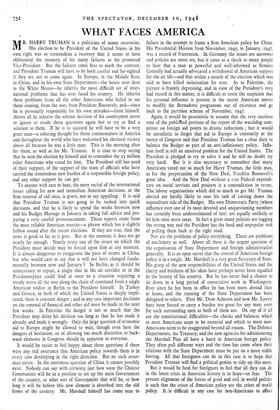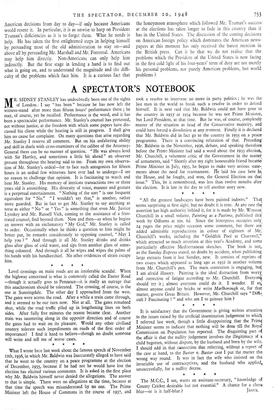WHAT FACES AMERICA
M R. HARRY TRUMAN is a politician of many recoveries. His election to be President of the United States in his own right was so tremendous a recovery that it seems to have obliterated the memory of his many failures as the promoted Vice-President. But the failures canie first to mark the contrast, and President Truman will have to be both careful and far-sighted if they are not to come again. In Europe, in the Middle East, in China, and in his own State Department—the house next door to the White House—he inherits the most difficult set of inter- national problems that has ever faced his country. He inherits these problems from all the other Americans who failed to see them coming, from the war, from President Roosevelt, and—since he is personally responsible for his own mistakes—from himself. Above all he inherits the solemn decision of his countrymen never to ignore or evade these questions again but to - try to find a solution to them. If he is to succeed he will have to be a very great man—a sobering thought for those commentators in America and throughout the world who have welcomed his electoral victory above all because he was a little man. This is the morning after for them, as well as for Mr. Truman. It is time to stop saying that he won the election by himself and to remember the 23 million other Americans who voted for him. The President still has need of their support, of the support of the team of officials who have carried the tremendous new burden of a responsible foreign policy, and any other support he can get.
To anyone with ears to hear, the mere recital of the international issues calling for new and immediate American decisions, or the firm renewal of old ones, is grave, not to say appalling. It is said that President Truman is not going to be rushed into quick decisions, and that he is likely to spend the weeks between now and his Budget Message in January in taking full advice and pre- paring a very careful pronouncement. These reports come from the most reliable American sources—a phrase which has a slightly hollow sound after the recent elections. If they are true, then the news is good so far as it goes. But at the moment it does not go nearly far enough. Nearly every one of the issues on which the President must decide may be forced upon him at any moment. It is always dangerous to exaggerate the pace of events in China, but who would care to say that it will not have changed funda- mentally between now and January ? In Berlin, as it should be unnecessary to repeat, a single shot in the air corridor or in the Potsdamerplatz could lead at once to a situation requiring a steady nerve all the way along the chain of command from a single American soldier in Berlin to the President himself. In Turkey and Greece, in both of which the United States is deeply impli- cated, there is constant danger ; and in any case important decisions on the renewal -of financial and other aid must be made in the next few weeks. In Palestine the danger is not so much that the President may delay his decision too long as that he has made it already, and made it wrongly. Only the large question of economic aid to Europe might be allowed to wait, though even here the dangers of hesitation, or of allowing too much discretion to back- ward elements in Congress should be apparent to everyone.
It would be easier to feel happy about these questions if there were any real assurance that American policy towards them is in every case developing in the right direction. But no such assur- ance exists. In the enormous question of China it cannot possibly exist. Nobody can say with certainty just how soon the Chinese Communists will be in a position to set up the main Government of the country, or what sort of Government that will be, or how long it will be before this new element is absorbed into the old bones of the country. Mr. Marshall himself has come near to failure in the attempt to frame a firm American policy for China. His Presidential Mission from November, 1945, to January, 1947, was a record of frustration. In Germany the issues are narrower and policies are more set, but it came as a shock to many people to hear that a man as powerful and well-informed as Senator Connally had actually adVocated a withdrawal of American support for the air lift—and that within a month of the election which was said to have killed isolationism for ever. As to Palestine, the picture is frankly depressing, and in view of the President's very bad record in this matter, it is difficult to resist the suspicion that his personal influence is present in the recent American moves to modify the Bernadotte programme out of existence , and go back to the partition scheme of November, 1947.
Again, it would be pessimistic to assume that the very cautious tone of the publisted portions of the report of the watchdog com- mittee on foreign aid points to drastic reductions ; but it would be unrealistic to forget that aid to Europe is constantly at the mercy of Congress and that President Truman has a clear duty to balance the Budget as part of an anti-inflationary policy. Infla- tion itself is still an unsolved problem for the United States. The President is pledged to try to solve it and he will no doubt try very hard. But it is also necessary to remember that many Americans voted not so much for Harry Truman, the little man, as for the perpetuation of the New Deal, Franklin Roosevelt's great idea. And the New Deal without a vast Federal expendi- ture on social services and projects is a contradiction in terms. The labour organisations which did so much to get Mr. Truman elected are hardly likely to ease his task of cutting down the expenditure side of the Budget. His own Democratic Party (whose influence over one of its most devoted and unquestioning members has certainly been underestimated of late) are equally unlikely to let him raise more tars. In fact a great many policies are tugging the wrong way and the President has the hard and unpopular task of pulling them back to the right road.
Nor are the problems of policy everything. There are problems of machinery as well. Above all there is the urgent question of the organisation of State Department and foreign administration generally. It is an open secret that the control of American foreign policy is in a tangle. Mr. Marshall is a very great Secretary of State. His grasp of the new responsibilities of the United States and the clarity and boldness of his ideas have perhaps never been equalled in the history of his country. But he has never had a chance to sit down to a long period of consecutive work in Washington. Ever since he has been in office he has been more abroad than at home, and the running of the State Department has been delegated to others. First Mr. Dean Acheson and now Mr. Lovett have been forced to carry a burden too great for any man, even for such outstanding men as both of them are. On top of it all are the constitutional. difficulties—the checks and balances which to most Americans seem to be essential and which to most non- Americans seem to be exaggerated beyond all reason. The Defence Departments, the Treasury, and the new agencies for administering the Marshall Plan all have a hand in American foreign policy. They often pull different ways and the time has come when their relations with the State Department must be put on a more stable footing. All that foreigners can do in this case is to hope that President Truman will .find a political genius to tidy up this mess.
But it would be fatal for foreigners to feel that all they can do in the latest crisis in American history is to hope—or fear. The present alignment of the forces of good and evil in world politics is such that the crises of American policy are the crises of world policy. It . is difficult in any case for non-Americans to affect American decisions from day to day—if only because Americans would resent it. In particular, it is as unwise to harp on President Truman's deficiencies as it is to forget them. What he needs is help. He has taken the first enlightened steps in helping himself by persuading most of the old administration to stay on—and above all by persuading Mr. Marshall and Mr. Forrestal. Americans may help him directly. Non-Americans can only help him indirectly. But the first stage in lending a hand is to find out what is going on, and to understand the magnitude and the diffi- culty of the problems which face him. It is a curious fact that the honeymoon atmosphere which followed Mr. Truman's success at the elections has taken longer to fade in this country than it has in the United States. The discussion of the coming decisions on American foreign policy which dominates the American news- papers at this moment has only received the barest mention in the British press. Can it be that we do not realise that the problems which the President of the United States is now facing in the first cold light of his four-years' term of duty are not merely his personal problems, nor purely American problems, but world problems ?















































 Previous page
Previous page